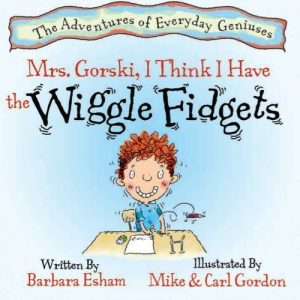David doesn't know how he ends up in such situations. At the time, it just seems like a great idea. His teacher, Mrs. Gorski, has had aout enough; he can tell by the way her voice changes when she speaks to him. This time, he believes that he has come up with the best idea yet. The perfect plan to make everything better.
Endorsements:
“The Mainstream Connections Children's Book Series conveys a message that could have been lifted straight from a psychology research journal: there is more than one way to define ‘being smart’. As these stories illustrate, for every person, large and small, there are skills that are relatively difficult to master and others that seem to come more naturally. These books emphasize the important empirical conclusion that just as regular exercise makes the body stronger, so, too, does practice and the effort to improve academically--with all the
struggle, fatigue, and initial failure that it entails--allow people to
capitalize on the malleable nature of human intelligence.”
Dr. Samuel R. Sommers, Tufts University
Professor of Psychology
“Your books are delightful! I can’t wait until they are published so that I can share them with our twice-exceptional clients. I love the way you transform negative reactions of parents and teachers into affirming strategies that support everyone involved. I especially enjoyed the way David used his creative
problem-solving skills to brainstorm all the ways he could handle his ‘Wiggle Fidgets’. Your books for children are definitely needed. I believe that they will make a real difference.”
Linda Kreger Silverman, Ph.D. Director, Gifted Development Center, Co-Chair of the National Association for Gifted Children (NAGC) Task Force on Assessment; she serves on the American Psychological Association Task Force on Giftedness.
“This is a wonderful book. Each story shows children that success is about effort and determination, that problems need not derail them, and that adults can understand their worries and struggles. My research demonstrates that these lessons are essential for children.”
Dr. Carol S. Dweck, Stanford University
Professor of Psychology
“I applaud Barbara Esham for finding a way to teach young children how to be more mindful. In so doing, she sets the stage for their greater well-being as adults.”
Dr. Ellen Langer, Harvard University
Professor of Psychology
“Katie’s dad can’t spell. Max can’t work under time pressure. Carolyn may never master cursive writing and David wiggles. They are typical of many students who struggle with some aspect of school. They are also lucky because each of them finds understanding or acceptance of their particular learning profiles. Whether it’s the realization that famous people have
sometimes been “different” learners, a teacher who understands that creativity counts too, or the ability to identify coping strategies, the four students put a human face on what it means to struggle in school- and how essential it is to have partners in persisting for success. Katie, Max, Carolyn, and David are good
news for students, parents, and teachers who want to understand what it means to learn outside the traditional lines of school.”
Dr. Carol Tomlinson, University of Virginia
Curry School of Education
Program Coordinator for the Educational Psychology and Gifted Education Program.
Endorsements:
“The Mainstream Connections Children's Book Series conveys a message that could have been lifted straight from a psychology research journal: there is more than one way to define ‘being smart’. As these stories illustrate, for every person, large and small, there are skills that are relatively difficult to master and others that seem to come more naturally. These books emphasize the important empirical conclusion that just as regular exercise makes the body stronger, so, too, does practice and the effort to improve academically--with all the
struggle, fatigue, and initial failure that it entails--allow people to
capitalize on the malleable nature of human intelligence.”
Dr. Samuel R. Sommers, Tufts University
Professor of Psychology
“Your books are delightful! I can’t wait until they are published so that I can share them with our twice-exceptional clients. I love the way you transform negative reactions of parents and teachers into affirming strategies that support everyone involved. I especially enjoyed the way David used his creative
problem-solving skills to brainstorm all the ways he could handle his ‘Wiggle Fidgets’. Your books for children are definitely needed. I believe that they will make a real difference.”
Linda Kreger Silverman, Ph.D. Director, Gifted Development Center, Co-Chair of the National Association for Gifted Children (NAGC) Task Force on Assessment; she serves on the American Psychological Association Task Force on Giftedness.
“This is a wonderful book. Each story shows children that success is about effort and determination, that problems need not derail them, and that adults can understand their worries and struggles. My research demonstrates that these lessons are essential for children.”
Dr. Carol S. Dweck, Stanford University
Professor of Psychology
“I applaud Barbara Esham for finding a way to teach young children how to be more mindful. In so doing, she sets the stage for their greater well-being as adults.”
Dr. Ellen Langer, Harvard University
Professor of Psychology
“Katie’s dad can’t spell. Max can’t work under time pressure. Carolyn may never master cursive writing and David wiggles. They are typical of many students who struggle with some aspect of school. They are also lucky because each of them finds understanding or acceptance of their particular learning profiles. Whether it’s the realization that famous people have
sometimes been “different” learners, a teacher who understands that creativity counts too, or the ability to identify coping strategies, the four students put a human face on what it means to struggle in school- and how essential it is to have partners in persisting for success. Katie, Max, Carolyn, and David are good
news for students, parents, and teachers who want to understand what it means to learn outside the traditional lines of school.”
Dr. Carol Tomlinson, University of Virginia
Curry School of Education
Program Coordinator for the Educational Psychology and Gifted Education Program.






